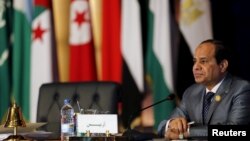The State Department said Tuesday that it would not meet with a Muslim Brotherhood group visiting Washington for a private conference but that its policy remained to engage Egypt's entire political spectrum.
The department announced the decision a day after sources told Reuters that the U.S. ambassador to Egypt had been summoned by Egyptian authorities because of their unhappiness about the private visit by Brotherhood figures to Washington.
Following the February 2011 ouster of autocrat and longtime U.S. ally Hosni Mubarak, Egypt has been enmeshed in a political struggle between the Brotherhood, an Islamist group, and more secular elements of society.
In 2013, Abdel Fattah el-Sissi, then Egypt's army chief and now its president, ousted the Muslim Brotherhood's Mohamed Morsi as president. Egyptian authorities have since banned the Islamist group and imprisoned and tried many of its leaders.
State Department spokesman Jeff Rathke told reporters the agency would not meet Brotherhood figures visiting Washington but gave no detailed explanation of why. U.S. officials had met with Brotherhood figures in Washington in January.
"We've decided not to hold a meeting," he said. "We engage with representatives from across the political spectrum. ... [I] don't have any further reasoning than we simply aren't meeting with them this time."
The tensions reflect a clash between U.S. diplomats' desire to deal with the whole political spectrum in Egypt and a fear of alienating Sissi.
The United States has had ambivalent dealings with Sissi, prizing the stability he has brought to Egypt while cautiously criticizing Egypt's human rights record and the authorities' crackdown on the Brotherhood.
Sissi, who was elected president in a 2014 landslide but with lower-than-expected turnout that raised questions about his mandate, regards the Brotherhood as part of a terrorist network that poses a threat to the Arab and Western world.
The Brotherhood says it is a peaceful movement.









